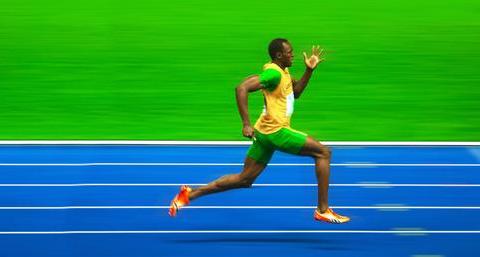Can Human Biology Break a 9-Second 100-Meter Record?

What’s the Latest Development?
This year’s summer Olympics are approaching and in sprinter Usain Bolt, the world has its best opportunity yet to test the limits of human biology with respect to speed. In just over a year, Bolt shaved 0.16 seconds off the 100 meter sprinting world record. Previously, it took eight athletes from 1991 to 2007 to do the same. So humans are getting faster but in pretty unpredictable ways. “Before 2008, mathematician Reza Noubary calculated that ‘the ultimate time for the 100 meter dash is 9.44 seconds.’ Following Bolt’s Beijing performance, he told Wired that the prediction ‘would probably go down a little bit’.”
What’s the Big Idea?
The biology of running can be divided into two general categories: What happens when a runner’s foot is off the ground and what happens when it is in contact with the ground. In the first category, nearly every human moving at their top speed spends about a third of second with their foot in the air, suggesting the presence of a biological limit. When a runner’s foot is on the ground, the more force that he or she can apply will allow for more speed. But unlike cycling, where an athlete’s weight and aerodynamic shape can be precisely calculated into performance terms, sprinting remains a “black hole”. For now, the only way to tell if sprinters will break records is to watch them.
Photo credit: Shutterstock.com





